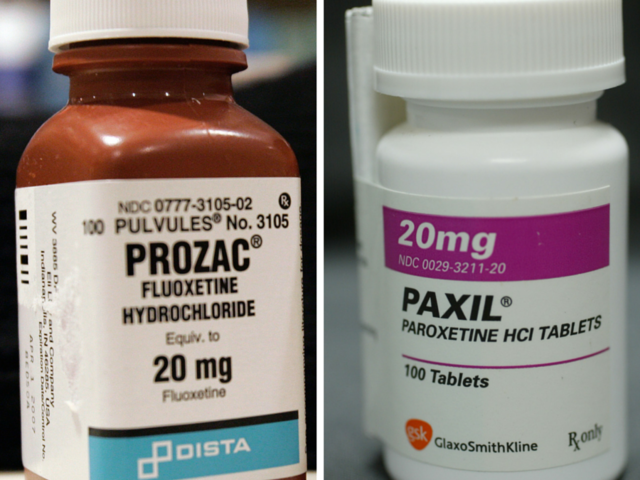-
Tips for becoming a good boxer - November 6, 2020
-
7 expert tips for making your hens night a memorable one - November 6, 2020
-
5 reasons to host your Christmas party on a cruise boat - November 6, 2020
-
What to do when you’re charged with a crime - November 6, 2020
-
Should you get one or multiple dogs? Here’s all you need to know - November 3, 2020
-
A Guide: How to Build Your Very Own Magic Mirror - February 14, 2019
-
Our Top Inspirational Baseball Stars - November 24, 2018
-
Five Tech Tools That Will Help You Turn Your Blog into a Business - November 24, 2018
-
How to Indulge on Vacation without Expanding Your Waist - November 9, 2018
-
5 Strategies for Businesses to Appeal to Today’s Increasingly Mobile-Crazed Customers - November 9, 2018
Pregnancy depression tablets risk birth defects
A bottle of the anti-depressant Prozac is pictured in Plainfield, Ind., Jan.11, 2008.
Advertisement
The risk of brain and skull malformation in babies is normally two in 10,000 births.
Women who take certain antidepressants during pregnancy are more likely to have a baby with a birth defect, research suggests.
However, the authors of the study, who included experts from the USA’s respected Centers for Disease Control and Prevention, stressed that the actual increased risk of already rare defects was small in each case.
The reason: In the past there have been conflicting studies, some that link selective serotonin reuptake inhibitors (SSRIs), the most commonly prescribed class of antidepressants in the US, with birth defects, including heart wall defects and misshapen skulls.
But the trials have been inconclusive, creating confusion.
One of the authors of the study is Dr. Jan Friedman, a professor of medical genetics at the University of British Columbia. “But it is important to keep in mind that even for these confirmed links, the risk for an individual woman who is taking [these medications] is still relatively small”.
Reefhuis said there were a number of limitations to the study, including the fact that the researchers did not know the dose of the antidepressants taken by the women or why they were taking them.
The team said that while they found reassuring evidence for some types of SSRI drugs, others significantly increased the chance of a baby being born with a defect.
While the findings can not prove causation, they back up previously observed associations of the drugs with heart defects and abnormalities affecting the skull and other parts of the body. He went in to add that unlike thalidomide or alcohol syndrome, these drugs simply don’t pose that kind of risk.
Results of past studies have been very mixed, with some claiming antidepressants caused birth defects, and some saying there was no correlation.
Numerous associations reported by other studies were not seen in this one. Reefhuis said that since Zoloft (sertraline) was the most common SSRI taken among the women, “it was reassuring that we could not replicate the five earlier links with birth defects”. Paroxetine also appeared to be linked to a higher risk of a condition called anencephaly, where the fetus’s brain does not fully develop. Researcher excluded those women who took antidepressants other than SSRIs or reported pre-existing diabetes.
For women taking Paxil, the risk of giving birth to a child with anencephaly rose from 2 in 10,000 to 7 in 10,000; the risk of giving birth to a child with a heart blood flow problem rose from 10 in 10,000 to 24 in 10,000, the study found.
“Although our analysis strongly supports the validity of the associations that were observed, the increase in the absolute risks, if the associations are causal, is small”, they said. He also felt it was important to point out that the risks are different from drug to drug.
The association between use of antidepressants, especially SSRIs, during pregnancy and birth defects in the infants has been the topic of much discussion in recent years.
She said the work was well done, though she expressed surprise that no associations were found between Zoloft – the most commonly prescribed SSRI – and birth defects, given the previous studies.
Dr Patrick O’Brien, spokesman for the Royal College of Obstetricians and Gynaecologists, added: ‘Our advice for pregnant women suffering with depression would be that generally the benefits outweigh the risks, however, all pros and cons should be discussed and weighed up by a woman, together with her obstetrician.’.
Advertisement
“Continued scrutiny of the association between SSRIs and birth defects is warranted”, they say, “and additional studies of specific SSRI treatments during pregnancy are needed to enable women and their healthcare providers to make more informed decisions about treatment”.





























